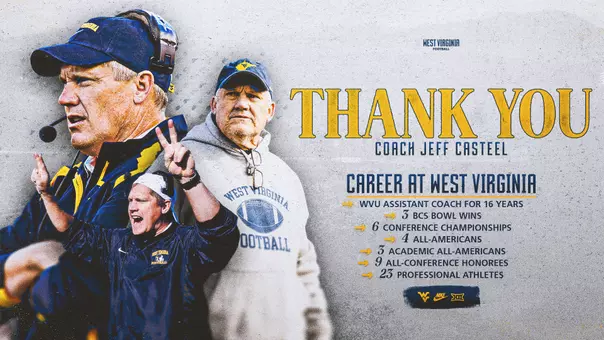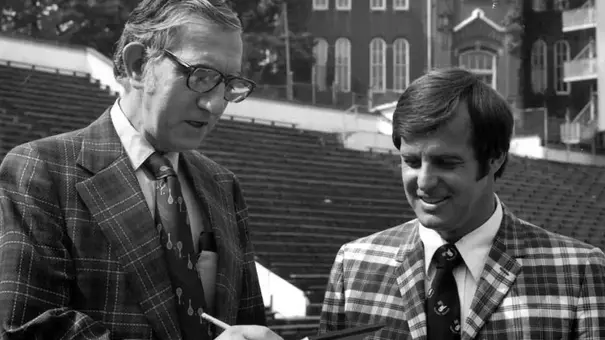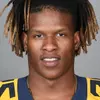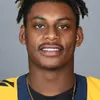Photo by: All Pro Photography/Dale Sparks
United Bank Playbook: Kansas State
November 08, 2017 12:51 PM | Football
MORGANTOWN, W.Va. - The secret sauce West Virginia applied to its rediscovered running game last Saturday against Iowa State may or may not work this weekend in Manhattan, Kansas, when the 23rd-ranked Mountaineers face Kansas State.
Perhaps as a result of West Virginia's difficulty running the football against TCU, Texas Tech, Baylor and Oklahoma State, Iowa State came into last Saturday's game believing it could control the ground game by only placing four defenders in the box.
WVU didn't take the bait, choosing instead to take those 4, 5 and 6-yard gains the Cyclones were allowing until Iowa State finally brought its safeties down after the Mountaineers hit a couple of big plays.
The end result was West Virginia's first 200-yard rushing performance since putting up a season-high 288 yards at Kansas back in week four.
Based on the limited success West Virginia has had running the football in the past against Kansas State, expecting another 200-yard rushing performance on Saturday against the Wildcats' four-man front is probably unrealistic.
"Defensively, they look like they always have," Mountaineer coach Dana Holgorsen said. "They haven't changed a whole lot over the years."
In five prior games against the Wildcats, West Virginia has tried 170 runs, gaining 604 yards for an average of 3.6 yards per carry.
WVU's most effective game running the football against K-State happened in 2015 when Wendell Smallwood ripped off 141 yards on 25 carries and the Mountaineers produced 166 rushing yards in a 24-23 loss in Manhattan.
Last year, Kansas State once again limited West Virginia's ground game to only 124 yards in the Mountaineers' 17-16 victory at Milan Puskar Stadium.
That contest turned in the fourth quarter, however, when Skyler Howard was able to complete a couple of passes, one going to Jovon Durante for a 7-yard touchdown with 6:11 remaining to overcome a 16-3 deficit fourth quarter deficit.
"Their front is big; they're just built to stop the run, as we all know," Holgorsen said. "They're a tough team to go toe-to-toe with. If you get into whatever personnel groupings that you get into, you're going to go toe-to-toe with those guys. They just keep adding people as you add people."
Teams can't totally abandon the run against these guys, but they have to be smart how they do it as WVU did last year with Justin Crawford, who registered 104 yards on an economical 18 carries against the Wildcats.
"You definitely want to emphasize running the ball," offensive coordinator Jake Spavital said. "Iowa State, we came out with a sense of urgency and we ran the ball pretty effectively at times. With guys like this, you have to see what type of a defense they are.
"Are they fast-type defense? Do they have a lot of movement? Do they do a lot of games and twists or are they guys who are going to hit their gaps and fight and be sound in what they do? (Kansas State) is pretty sound in what they do. These guys don't play freely because they dominate the job at hand," Spavital added.
Crawford's reemergence last Saturday against Iowa State, rushing for more than 100 yards (102) for the first time since week five's 111-yard performance at TCU, was sorely needed.
During the three-game stretch following the TCU game against Texas Tech, Baylor and Oklahoma State, Crawford carried the ball 37 times for 122 yards and just one touchdown, against the Red Raiders.
Backups Kennedy McKoy and Martell Pettaway weren't adding much punch in the ground game in a supporting role either.
Then, Holgorsen challenged his team last week to play tougher, prescribed more physical practices during the week and the run game came to life against the Cyclones.
In addition to Crawford's 102 yards, McKoy made the play of the game late in the fourth quarter when he took a draw handoff from quarterback Will Grier on third and 17 and got a first down to help West Virginia run out the clock.
"It all game together for us," running backs coach Tony Dews said. "I wish I had the answer or else I would have corrected it three weeks ago. But I think our team took what Coach Holgorsen said to heart and I think they reflected back to what this team has been the last several years and Coach Holgorsen talked about what this program has been built on.
"These kids reflect, too, and to win 10 games last year there was a lot of toughness displayed, so through a week of talking about it they realized that that was needed."
It was a tough, physical football game that required winning efforts in all three phases - which West Virginia got last Saturday.
Holgorsen said he expects a similar effort is going to be required this Saturday to beat Kansas State, although the formula for success might come a little differently.
The Wildcats (5-4, 3-3) are giving up a few more total yards and points than normal, but they still rank among the top defenses in the Big 12 against the run, allowing just 126.8 yards per game. Being patient and taking those 4, 5 and 6-yard runs like West Virginia did against Iowa State is probably not very realistic, however.
"They're not a drop-eight team," Spavital said. "They're going to rush four so there will obviously be a lot more holes in the pass game, but they're a lot more sound in the run game. You're not going to take those 4, 5, 6-yard gains every time you hand the ball of running into a four-down front, so the quarterback process is going to change based off of how the flow of the game is."
"They cover your guards up and now you have different types of fits and that puts pressure on the inside guys," offensive line coach Joe Wickline said. "It's a sound defense. It's four-down, two inside and two outside backers and the other thing is they play physical and hard. That's a beautiful thing. It's a compliment to their staff and their players.
"But so do we," Wickline added. "It's a big game and a big challenge for our guys."
Therefore, the big opportunities will most likely come through the air where Kansas State forces quarterbacks and wide receivers to be accurate with their throws and routes.
And this is where West Virginia has really struggled against Kansas State - more so than running the football. In the last four meetings against the Wildcats, Mountaineer quarterbacks have been unable to complete a very high percentage of their passes. Last year, it was 58.5 percent. Two years ago in Manhattan it was 45.2 percent.
In 2014, West Virginia's completion rate was 56.2 percent and four years ago, in 2013, it was once again just 45.2 percent.
Even Geno Smith struggled throwing the football against Kansas State, passing for a season-low 155 yards with two interceptions in a 55-14 defeat in 2012.
That means Will Grier is going to have to be accurate with his intermediate and deep throws on Saturday, and the receivers are going to have to beat man coverage, run precise routes, be physical, catch contested passes and score when they get out in the open.
Getting tackled or being caught from behind only plays right back into K-State's hands because the Wildcats are once again outstanding in the red zone.
Why does cagey Bill Snyder choose to play this way? Because when your defense is only defending 60 plays per game, simple math dictates that there are going to be fewer opportunities to hit big plays against them.
"They don't defend as many possessions compared to other teams in this conference because they do a great job of playing together and holding the ball with time of possession as an offense," Spavital explained.
The percentages have clearly not been in West Virginia's favor, which is a major reason why Snyder's teams have fared so well against it.
It's also one of the reasons why he's won 65.4 percent of the football games in which he's coached during a very long and successful coaching career.
Saturday's game will kick off at 3:30 p.m. (EST) and will be televised nationally on ESPN2 (Anish Shroff, Mike Golic and Roddy Jones).
The Mountaineer Sports Network from IMG's coverage begins with the Mountaineer Tailgate Show at noon leading into regular game coverage at 2:30 p.m. on stations throughout West Virginia, online through WVUsports.com and the popular mobile app TuneIn.
United Bank Playbook produced by Sean Merinar
Perhaps as a result of West Virginia's difficulty running the football against TCU, Texas Tech, Baylor and Oklahoma State, Iowa State came into last Saturday's game believing it could control the ground game by only placing four defenders in the box.
WVU didn't take the bait, choosing instead to take those 4, 5 and 6-yard gains the Cyclones were allowing until Iowa State finally brought its safeties down after the Mountaineers hit a couple of big plays.
The end result was West Virginia's first 200-yard rushing performance since putting up a season-high 288 yards at Kansas back in week four.
Based on the limited success West Virginia has had running the football in the past against Kansas State, expecting another 200-yard rushing performance on Saturday against the Wildcats' four-man front is probably unrealistic.
"Defensively, they look like they always have," Mountaineer coach Dana Holgorsen said. "They haven't changed a whole lot over the years."
In five prior games against the Wildcats, West Virginia has tried 170 runs, gaining 604 yards for an average of 3.6 yards per carry.
WVU's most effective game running the football against K-State happened in 2015 when Wendell Smallwood ripped off 141 yards on 25 carries and the Mountaineers produced 166 rushing yards in a 24-23 loss in Manhattan.
Last year, Kansas State once again limited West Virginia's ground game to only 124 yards in the Mountaineers' 17-16 victory at Milan Puskar Stadium.
That contest turned in the fourth quarter, however, when Skyler Howard was able to complete a couple of passes, one going to Jovon Durante for a 7-yard touchdown with 6:11 remaining to overcome a 16-3 deficit fourth quarter deficit.
"Their front is big; they're just built to stop the run, as we all know," Holgorsen said. "They're a tough team to go toe-to-toe with. If you get into whatever personnel groupings that you get into, you're going to go toe-to-toe with those guys. They just keep adding people as you add people."
Teams can't totally abandon the run against these guys, but they have to be smart how they do it as WVU did last year with Justin Crawford, who registered 104 yards on an economical 18 carries against the Wildcats.
"You definitely want to emphasize running the ball," offensive coordinator Jake Spavital said. "Iowa State, we came out with a sense of urgency and we ran the ball pretty effectively at times. With guys like this, you have to see what type of a defense they are.
"Are they fast-type defense? Do they have a lot of movement? Do they do a lot of games and twists or are they guys who are going to hit their gaps and fight and be sound in what they do? (Kansas State) is pretty sound in what they do. These guys don't play freely because they dominate the job at hand," Spavital added.
Crawford's reemergence last Saturday against Iowa State, rushing for more than 100 yards (102) for the first time since week five's 111-yard performance at TCU, was sorely needed.
During the three-game stretch following the TCU game against Texas Tech, Baylor and Oklahoma State, Crawford carried the ball 37 times for 122 yards and just one touchdown, against the Red Raiders.
Backups Kennedy McKoy and Martell Pettaway weren't adding much punch in the ground game in a supporting role either.
Then, Holgorsen challenged his team last week to play tougher, prescribed more physical practices during the week and the run game came to life against the Cyclones.
In addition to Crawford's 102 yards, McKoy made the play of the game late in the fourth quarter when he took a draw handoff from quarterback Will Grier on third and 17 and got a first down to help West Virginia run out the clock.
"It all game together for us," running backs coach Tony Dews said. "I wish I had the answer or else I would have corrected it three weeks ago. But I think our team took what Coach Holgorsen said to heart and I think they reflected back to what this team has been the last several years and Coach Holgorsen talked about what this program has been built on.
"These kids reflect, too, and to win 10 games last year there was a lot of toughness displayed, so through a week of talking about it they realized that that was needed."
It was a tough, physical football game that required winning efforts in all three phases - which West Virginia got last Saturday.
Holgorsen said he expects a similar effort is going to be required this Saturday to beat Kansas State, although the formula for success might come a little differently.
The Wildcats (5-4, 3-3) are giving up a few more total yards and points than normal, but they still rank among the top defenses in the Big 12 against the run, allowing just 126.8 yards per game. Being patient and taking those 4, 5 and 6-yard runs like West Virginia did against Iowa State is probably not very realistic, however.
"They're not a drop-eight team," Spavital said. "They're going to rush four so there will obviously be a lot more holes in the pass game, but they're a lot more sound in the run game. You're not going to take those 4, 5, 6-yard gains every time you hand the ball of running into a four-down front, so the quarterback process is going to change based off of how the flow of the game is."
"They cover your guards up and now you have different types of fits and that puts pressure on the inside guys," offensive line coach Joe Wickline said. "It's a sound defense. It's four-down, two inside and two outside backers and the other thing is they play physical and hard. That's a beautiful thing. It's a compliment to their staff and their players.
"But so do we," Wickline added. "It's a big game and a big challenge for our guys."
Therefore, the big opportunities will most likely come through the air where Kansas State forces quarterbacks and wide receivers to be accurate with their throws and routes.
And this is where West Virginia has really struggled against Kansas State - more so than running the football. In the last four meetings against the Wildcats, Mountaineer quarterbacks have been unable to complete a very high percentage of their passes. Last year, it was 58.5 percent. Two years ago in Manhattan it was 45.2 percent.
In 2014, West Virginia's completion rate was 56.2 percent and four years ago, in 2013, it was once again just 45.2 percent.
Even Geno Smith struggled throwing the football against Kansas State, passing for a season-low 155 yards with two interceptions in a 55-14 defeat in 2012.
That means Will Grier is going to have to be accurate with his intermediate and deep throws on Saturday, and the receivers are going to have to beat man coverage, run precise routes, be physical, catch contested passes and score when they get out in the open.
Getting tackled or being caught from behind only plays right back into K-State's hands because the Wildcats are once again outstanding in the red zone.
Why does cagey Bill Snyder choose to play this way? Because when your defense is only defending 60 plays per game, simple math dictates that there are going to be fewer opportunities to hit big plays against them.
"They don't defend as many possessions compared to other teams in this conference because they do a great job of playing together and holding the ball with time of possession as an offense," Spavital explained.
The percentages have clearly not been in West Virginia's favor, which is a major reason why Snyder's teams have fared so well against it.
It's also one of the reasons why he's won 65.4 percent of the football games in which he's coached during a very long and successful coaching career.
Saturday's game will kick off at 3:30 p.m. (EST) and will be televised nationally on ESPN2 (Anish Shroff, Mike Golic and Roddy Jones).
The Mountaineer Sports Network from IMG's coverage begins with the Mountaineer Tailgate Show at noon leading into regular game coverage at 2:30 p.m. on stations throughout West Virginia, online through WVUsports.com and the popular mobile app TuneIn.
United Bank Playbook produced by Sean Merinar
Players Mentioned
Rich Rodriguez | Dec. 3
Wednesday, December 03
Reid Carrico | Nov. 29
Saturday, November 29
Jeff Weimer | Nov. 29
Saturday, November 29
Rich Rodriguez | Nov. 29
Saturday, November 29
























